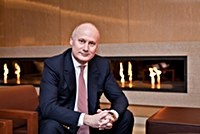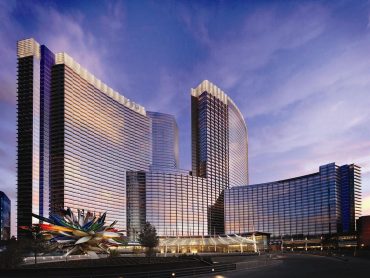Better Than Swiss Chocolate
The Kempinski brand name, approaching 100 years old, is renowned throughout Europe, Asia and the Middle East, and yet it still maintains an air of mystery about it. My recent trip to Geneva prompted me to stay at the Grand Kempinski rather than a more recognizable product like the Four Seasons just a few buildings further along the lakefront avenue. With a modern black-tinted glass look, the property is a strong contrast to the powerful stone façades of the other hotels on the row. As this is flagship property for the Kempinski brand, it is indeed most impressive.
I met Mr. Theirry LaValley, General Manager, for breakfast in The Restaurant, a room with a flawless view of the fountain that dominates the center of Geneva. While we were in discussion, I could not help but notice the precision and service quality of the breakfast being served in this bustling outlet. Yet, I didn’t let an excellent meal stop me from keeping my focus on the conversation at hand.
What differentiates a Kempinski property from that of another luxury chain?
I think the key difference is the decentralization of management decision-making. Within Kempinski, there is a much higher degree of autonomy given to the local manager. True, we abide by set standards of performance, but the degree in which we execute the standard is very much set to our own mandates.
Let me give you some examples. For procurement of items such as bed linens or flatware, our corporate mandate says ‘fine quality’. It does not state that we must purchase one brand, or, even more specific, make that purchase from a specific supplier. The same applies in our food acquisition policies that allow us to source unique local producers, providing a very special experience for this property.
I have been very impressed by the staff’s service delivery. How do you maintain this high degree of service integrity?
I consider myself the human resources director. I will personally make sure that I interview every one that applies to our property. For an entry-level line position, this may be a short, five-minute review, clearly longer for an individual being considered for management track. The purpose of my interview is less about the functional aspects, but most importantly to understand the individual’s spirit and personality – in other words, their fit to the Kempinski Geneva service approach. To me, everything else can be trained.
The role of concierge is different in Kempinski properties. Can you explain?
This is one of the unique aspects of Kempinski and one that we are very excited about. Our concierge service reflects the traditions of Les Clefs d’Or, offering the utmost in support to our guests’ needs. What we add onto this tradition is the ‘Lady in Red’. In effect, we have two levels or approaches to helping the guest: the concierge who focuses on activities outside of the property, such as airport connections or entertainment; and the Lady in Red, who deals primarily with in-house needs. Together, they form a ring of service for our guests.
Talking now more specifically about your Geneva property, tell me how you differentiate yourself from competition?
There is certainly no shortage of luxury in Geneva, and many of our competitive set such as the Four Seasons or Beau Rivage are well-known for their service and physical excellence. Our market happens to be a little broader than theirs, in that our larger size gives us the ability to attract groups to bolster our sales base. Our 1,350 seat theatre – unique in the country I might add – gives us a ‘raison d’etre’ for us as a destination hotel for major product launches and important events. And lastly, as you experienced, our banqueting facilities offer the ability to cater to the needs of groups without sacrificing quality or individuality.
Can you tell me more about some of the local initiatives you take?
We are very conscious of the raw ingredients of our food supply. One of our approaches is to literally shorten, where possible, the delivery chain. You noticed the butter on the breakfast buffet? It is from cows in our own farm. So too is some of the cheese and yogurt selections, and in summer, our rooftop gardens for honey, vegetables and herbs. Even our fish come directly from fishermen who work for us. At times, we are almost perfectly vertically integrated.
We don’t hear very much about Kempinski in North America. Why do you not have Kempinski properties in New York or Chicago, for example?
It is not an issue of being differential to America, as it is an important market for our brand. Rather, it is one of our management team planning the best approach. Our CEO has always said that we would never have more hotels than the number of years that our company has been in existence. So, our approach is perhaps a little bit more determined, more gradual than other chains. We are looking at destinations that will appreciate what we have to offer, rather than just entering a market for the sake of saying we are there.
Any closing remarks?
The role of hotelier is multi-faceted. I see it four ways:
- First: to our guest, to deliver an exceptional experience.
- Second: to our team, to fulfill their role of growth in responsibility.
- Third: to our community to participate and support their endeavors
- And Fourth: to our owners to provide the basis for sustained asset growth.
(Article published by Larry Mogelonsky in eHotelier on October 23, 2013)




